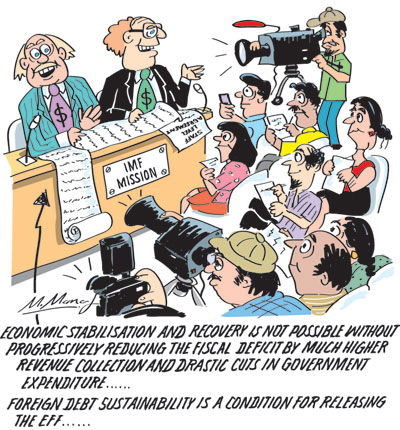Columns
Foreign debt sustainability and fiscal consolidation imperative, difficult and challenging
View(s): While foreign debt sustainability is a condition for obtaining IMF assistance, the immediate reduction in the fiscal deficit and its progressive decrease are essential for economic stabilisation and economic recovery.
While foreign debt sustainability is a condition for obtaining IMF assistance, the immediate reduction in the fiscal deficit and its progressive decrease are essential for economic stabilisation and economic recovery.
IMF agreement
Although a staff level agreement has been agreed on with the International Monetary Fund (IMF) to obtain an Extended Fund Facility (EFF) of US$ 2.9 billion in the next four years, this will be provided only after foreign debt sustainability is demonstrated.
Debt sustainability
This condition of foreign debt sustainability must be fulfilled for obtaining IMF Executive Board approval of the EFF. Reaching an agreement with the country’s foreign creditors on external debt sustainability to obtain the first tranche is a difficult one.
China
Agreement among creditors on debt restructuring appears difficult owing to a Chinese reluctance to restructure its outstanding debt. This is due to its principle of not restructuring loans. China is however willing to assist us with further loans.Hopefully, a way would be found to get around this hurdle.
Fiscal deficit
The immediate reduction in the fiscal deficit and its progressive decrease in the next few years are essential for economic stabilisation and economic recovery. This has to be achieved by both an increase in taxation and the curtailment of expenditure that will be opposed by many.
Opposition
In as much as the Government, pragmatic economists and enlightened opinion, are aware that the IMF bailout is imperative to resolve the current economic crisis, there are several political parties and a large section of the population that are opposed to seeking IMF assistance owing to the conditions attached to such lending.
No alternative
Although those opposed to the IMF bailout do not have a pragmatic alternative, they remain opposed to obtaining an IMF loan facility. This opposing stance is politically popular, as the IMF is portrayed as an institution that lays down conditions that heap hardships on people.
Price escalation
For instance, there is opposition to the IMF’s condition that import commodities, such as petrol, diesel, gas and wheat flour, should be sold at cost. Consequently, when international prices increase and the rupee depreciates, prices rise sharply.Opposing such pricing policy is popular.
Privatisation
Another clear instance of such opposition is to the privatisation of state-owned enterprises. Political parties, trade unions, a majority of Parliamentarians and people are strongly opposed to privatisation of the large number of loss-making state-owned enterprises.
Political parties
As pointed out in previous columns, the Sri Lanka Podujana Peramuna (SLPP), the governing party that controls a comfortable majority in Parliament, is opposed to privatisation.Paradoxically, it is the main Opposition party, the Samagi Jana Balawegaya (SJB), that may be supportive of privatisation.
Other parties
Most political parties oppose the privatisation of state-owned enterprises and portray it as a sale of people’s assets. The burden of these lossmaking enterprises on the people is never mentioned.
An unrealistic prospect
Parties that have not been in power conveniently say that when they came to power they will transform the SOEs to profit making concerns earning revenue for the government.
Fiscal deficit
The immediate reduction in the fiscal deficit and its progressive decrease in the next few years are vital for economic stabilisation and for the island’s economic recovery. This has to be achieved by both an increase in revenue and the curtailment of expenditure.
Loss making state enterprises
The elimination or a sharp decrease of the losses of SOEs is one significant means of reducing expenditure. The rationalisation and reduction of government expenditure is needed immediately.
Strategy
Fiscal consolidation or the reduction of the budget or fiscal deficit has to be achieved through a twin strategy of enhancing revenue, and a drastic reduction in expenditure on the other hand. Both strategies would be politically unpopular and administratively difficult. However, they are imperative.
Crucial
Fiscal consolidation is the most important, difficult and challenging task of the budget that will be presented by the Government in November. It is the most difficult and politically challenging task.
Expectation
The expectation that the fiscal deficit would be reduced to 5.6 percent of GDP has to be achieved by an increase in revenue, collection and a curtailment of imprudent expenditure cuts. The central task of the forthcoming Budget for 2023, scheduled to be presented in November is to decrease the budget deficit drastically.
In conclusion
The progressive reduction in budget deficits is imperative for the economy’s revival, recovery, reconstruction and development. Quite apart from fiscal consolidation being a condition for IMF assistance, it is a precondition for economic stability and growth. Unfortunately, it is also the most difficult and politically challenging task.
The immediate reduction in the fiscal deficit and its progressive decrease in the next few years are vital for economic stabilisation and growth. Hopefully the fiscal deficit for 2022 will be brought down to 9.6 percent of GDP by the revisions in expenditure and the increased revenue from the proposed tax measures.
Next Sunday
Next Sunday’s column will discuss a pragmatic strategy for reducing the fiscal deficit by a progressive and effective tax system to achieve the Government’s target of 5.3 percent of GDP in 2025.
Buying or selling electronics has never been easier with the help of Hitad.lk! We, at Hitad.lk, hear your needs and endeavour to provide you with the perfect listings of electronics; because we have listings for nearly anything! Search for your favourite electronic items for sale on Hitad.lk today!


Leave a Reply
Post Comment